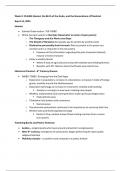Class notes
Lecture 2 Notes for CLA204
- Course
- CLA204 (CLA204)
- Institution
- University Of Toronto (U Of T )
A complete notes from 2024 CLA204H1F Online Asynchronous course from University of Toronto St. George. Notes of every lecture including what's on the slides and important points which professor covers.
[Show more]



